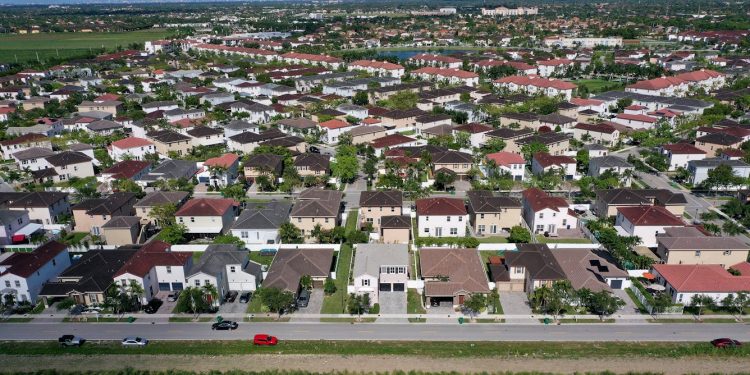Homeownership – long a cornerstone of the “the American dream” – is increasingly out of reach for the average American. Over the past four decades, U.S. house prices have risen by 75% in real terms, pushing the costs of homeownership for the typical first-time homebuyer to a record high. At the same time, these rising prices have significantly boosted the wealth of existing homeowners.
As a sociologist who studies inequality in America through the lens of housing, I’ve spent the past few years looking into how rising house prices have affected the wealth gap between white and Black households, which has widened significantly over the past four decades. White families had about US$90,000 more wealth – in 2021 dollars – than their Black counterparts in 1984, an alarmingly wide gap. But by 2021, the gap had widened to almost $160,000.
My recent peer-reviewed research, published in the journal Social Problems, found that the rise in house prices between 1984 and 2021 accounted for most of this widening gap. Using data from the University of Michigan’s Panel Study of Income Dynamics, which tracks a nationally representative group of American families over time, I explored how homeowners’ wealth trajectories would have differed if they hadn’t benefited from rising house prices.
I found that housing market appreciation widened the median wealth gap between white and Black households by nearly $50,000 between 1984 and 2021. Given that home prices have continued to rise since 2021, it’s fair to assume that this gap has widened further over the past few years.
Why a rising tide doesn’t lift all boats
I also investigated why rising house prices widened the wealth gap by so much. The most important cause is the long-standing disparity in homeownership rates. White households had a homeownership rate of 74% at the end of 2021, compared with only 43% for Black households. As a result, they were much more likely to have benefited from rising home values, which directly increased their home equity.
White homeowners also tend to own more expensive homes than Black homeowners. While this is a less important factor, it means that they saw greater absolute gains in home equity than Black homeowners from the same percentage rise in the housing market.
However, I also found an interesting exception: Black homeowners benefited more from neighborhood-level housing market trends. One possible explanation is that the gentrification of Black neighborhoods in recent decades led to outsize housing market appreciation in these neighborhoods – which disproportionately boosted the home equity of existing Black homeowners.
The impact of history – and ideas for the future
I became interested in housing and wealth inequality when I attended graduate school in the San Francisco Bay Area, one of the least affordable housing markets in the world. Many homeowners who had bought their homes in the 1970s for tens of thousands of dollars were now sitting on millions of dollars in home equity. Meanwhile, buying a home in this area seemed out of reach for all but the highest-earning families, effectively locking renters out of the wealth-building effects of rising house prices.
My curiosity about rising house prices led me to explore how they shape wealth inequality – not just between homeowners and renters, but also between racial groups. The more I read, the more I learned about the many legal, political and social barriers that have kept Black families from becoming homeowners.
These include exclusionary zoning policies and racial covenants that locked Black families out of many neighborhoods, reduced access to mortgage lending in historically Black neighborhoods, and persistent hiring and workplace discrimination that have kept Black families from accumulating wealth.
Addressing these inequities will require thoughtful policy solutions. As a sociologist studying these issues, I have some recommendations on contemporary policies that can increase access to homeownership for less affluent households. Given racial disparities in wealth, these policies would also help to reduce racial gaps in homeownership:
-
Reform local housing regulations: By easing restrictions on housing development, cities can help alleviate the housing shortage that’s helping to drive up home prices. Austin, Texas, is an example of a city that has successfully curbed rising home prices by dramatically increasing its housing construction. Lower house prices would then allow a greater range of families to own homes.
-
Implement land value taxes: Traditional property taxes can discourage residential development because landowners pay higher taxes after they develop their land. In contrast, land value taxes are only assessed on the value of the land, which encourages landowners to put their land to the most productive use. Over time, land value taxes would lead to greater residential development in areas that need it most, which would then reduce upward pressures on house prices.
-
Subsidize homeownership: While using federal funds to subsidize homeownership would come with the risk of inflating prices, this could help more low-income households enter and maintain homeownership and thereby benefit from future housing market appreciation.
Future directions for research
I am currently extending this work in several directions. In collaboration with Ohio State University sociologist Chinyere Agbai and Stone Center for Inequality Dynamics Student Associate Nils Neumann, I am examining how the home mortgage interest deduction has affected the wealth gap between white and Black households over time. Introduced in 1913, this deduction is one of the largest tax breaks available to American households, but Black households are much less likely than white households to benefit from it, in part due to lower rates of homeownership.
Our preliminary findings suggest the home mortgage interest deduction has substantially widened the wealth gap between white and Black households over the past several decades.
I’m also investigating the role of parental wealth in helping children buy homes in increasingly unaffordable housing markets. My findings suggest that young homebuyers in expensive areas come from much wealthier backgrounds and receive more financial assistance when buying their homes than first-time homebuyers in other neighborhoods. I also found that family help makes young adults substantially more likely to become first-time homeowners.
If Americans want to work toward creating a more equitable society, understanding the connections between housing, wealth and racial inequality is an important place to start.
![]()
In conducting this research, Joe LaBriola received support from the James M. and Cathleen D. Stone Center for Inequality Dynamics at the University of Michigan, the National Science Foundation, the National Institutes of Health, the UC Berkeley Opportunity Lab, the Horowitz Foundation for Social Policy, and the UC Berkeley Institute for Governmental Studies.













